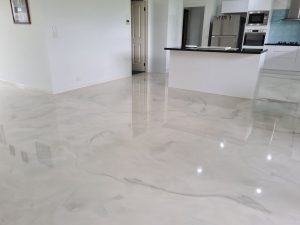Epoxy Resin Flooring- Ultimate Guide to Epoxy Flooring
Epoxy resin flooring is a durable and long-lasting flooring created by mixing epoxy resin with a hardening agent. This mixture creates a chemical reaction that results in a strong, rigid plastic material. Epoxy resin flooring represents a modern and versatile option, combining durability, aesthetics, and easy maintenance.

Highly Preferred in industrial settings, it provides a seamless and resilient surface capable of withstanding heavy machinery and traffic and maintaining a polished appearance. With its unique composition and hard-wearing properties, epoxy resin flooring is increasingly adopted in commercial and residential spaces for its style and practicality.
Types of Epoxy Resin Flooring
There are different types of epoxy resin flooring, each with unique properties and uses. Some popular styles include:
Self-leveling epoxy floors
Self-leveling epoxy floors provide a highly polished, seamless finish ideal for commercial, industrial, and residential applications where an attractive, easy-to-clean, and durable surface is needed. They are used in large spaces such as warehouses, commercial kitchens, and garages because they resist spills, stains, and heavy traffic. The installation involves pouring the mixture onto the floor and allowing it to spread and level independently, hence the term self-leveling.
Gravelled epoxy floors
The most decorative choice in epoxy flooring, graveled epoxy floors are a striking addition to any space, offering an array of design possibilities. These floors are created by combining epoxy resin with coloured gravel, producing an eye-catching and durable textured surface.
Ideal for adding a unique, personalized touch to commercial or residential spaces, graveled epoxy floors are often chosen for their aesthetic appeal as much as for their functional benefits.
With their decorative nature, they remain a practical choice, resistant to wear and tear and easy to maintain. It is used in showrooms, galleries, and commercial spaces due to its durability and aesthetic appeal.
Mortar epoxy floors
Mortar epoxy floors are considered the strongest of all epoxy flooring types, providing a high-performance surface suited for the most demanding environments. Created by combining epoxy resin with sand, these floors offer an unrivaled level of durability, making them perfect for industries that require a rugged, resistant flooring solution.
Examples include manufacturing facilities, heavy-duty workshops, and extreme wear and tear garages. They may lack the decorative appeal of graveled epoxy, but their robustness and longevity make them a trusted solution where flooring performance takes precedence.
Terrazzo epoxy floors
Terrazzo epoxy floors are a modern take on traditional terrazzo, offering a seamless, high-gloss flooring solution. The durability of epoxy resin combined with the beauty of marble or glass chips results in attractive and robust flooring. The chips are mixed into the epoxy and then spread over the floor. After it hardens, the surface is polished to reveal the beauty of the scattered fragments.
This type of flooring is ideal for large commercial and public spaces due to its design flexibility, durability, and easy maintenance. Despite its luxurious appearance, terrazzo epoxy flooring is cost-effective, given its longevity and low maintenance requirements.
How Much Does Epoxy Flooring Cost?
The cost of epoxy flooring can vary widely depending on several factors. These include the type of epoxy flooring selected, the size of the area that needs to be covered, the condition of the existing floor, and the region where you live.
On average, homeowners in the United States can expect to pay between $3 and $12 per square foot for professional installation. Self-leveling epoxy floors, for example, can cost between $3 and $7 per square foot, and highly decorative gravel epoxy floors can range from $5 to $13 per square foot. More robust options, such as mortar and terrazzo epoxy floors, can be on the higher end of the price spectrum, typically ranging from $10 to $20 per square foot.
Benefits of Epoxy Resin Flooring
Epoxy resin flooring offers numerous benefits, making it a preferred option in various settings. Some benefits of this type of flooring include:
Durability
Epoxy resin flooring is highly durable and resistant to wear and tear. It’s designed to withstand high traffic levels, making it a perfect choice for environments such as warehouses and manufacturing facilities.
Easy to Maintain
Epoxy resin flooring is straightforward to maintain, with its seamless surface allowing for quick and easy cleaning. It’s resistant to most stains, including oil and grease, and doesn’t harbour dirt or bacteria.
The non-porous nature of the flooring means that spills can be easily wiped away without worrying about permanent stains or damage. This makes it convenient for commercial and residential settings, where cleanliness and hygiene are paramount.
Hard-wearing and resistant
Epoxy resin flooring is hard-wearing and resistant, making it a suitable choice for areas that experience heavy footfall or machinery usage. Its unique composition allows it to combat chemical spills, impact, and thermal shock damage.
The type of flooring doesn’t just withstand these elements but maintains its appearance and functionality over time. This resilience to harsh conditions is one of the features that sets epoxy resin flooring apart from other flooring options, providing a long-lasting and cost-effective solution.
Safety
Epoxy resin flooring offers enhanced safety. It’s resistant to slip, heat, and impact, safeguarding the well-being of people who use the space. It’s also resistant to chemicals, making it a safe option for industries that deal with hazardous materials.
Versatility
Epoxy resin flooring can be customized to suit specific needs and preferences. It can be applied over existing floors, and its properties can be adjusted to meet the requirements of different environments.
Cost-Effective
Given its durability, low maintenance requirements, and longevity, epoxy resin flooring is a cost-effective solution for commercial and residential applications. It provides excellent value for money over its lifespan.
Maintenance Tips for Epoxy Resin Flooring
Epoxy resin flooring is known for its durability and low maintenance requirements; proper care can extend its lifespan even further. Here are some maintenance tips to ensure that your epoxy resin flooring stays in top condition:
- Sweeping the floor daily with a soft broom or dust mop will keep it free from dust and debris. For a more thorough cleaning, a damp mop can be used. Use mild, pH-neutral cleaners to avoid damaging the epoxy coating if necessary.
- Despite its resistance to chemicals and stains, cleaning up spills immediately is advisable to prevent potential discolouration or damage.
- Abrasive cleaners or tools can scratch the surface of your epoxy resin flooring. Stick to soft cleaning tools and avoid using harsh chemicals.
- Protective pads under the legs can prevent scratches and dents in areas with heavy machinery or furniture.
- Consider having your floor professionally inspected annually for any signs of damage that may need repair. This can help maintain the longevity and performance of your epoxy resin floor.
Conclusion
Epoxy resin flooring is a versatile and durable solution for various settings, from industrial environments to residential homes. Its numerous benefits and customization options have become a popular choice among architects, designers, contractors, and homeowners. If you’re looking for a solid, resistant surface or a visually appealing design feature, epoxy resin flooring covers you. If you need a reliable and long-lasting flooring solution, consider the many benefits of epoxy resin flooring.
FAQs
How long does an epoxy resin floor last?
With proper installation and maintenance, epoxy resin flooring can last for several decades. The lifespan can be affected by the level of foot or vehicle traffic and the type of environment it is in.
Can epoxy resin flooring be installed over any existing floor?
Yes, epoxy resin can be applied over most existing floors, including concrete and wood. The existing floor must be thoroughly cleaned, and any cracks or damages must be repaired before application.
How soon can you walk on an epoxy resin floor after installation?
You can walk on an epoxy resin floor 24 to 48 hours after installation. This can vary depending on the specific type of epoxy used and the environmental conditions.
Is epoxy resin flooring safe for the environment?
Epoxy resin flooring is generally considered safe for the environment as it significantly reduces the need for new materials and is long-lasting.
Can I install an epoxy resin floor by myself?
It’s possible to install an epoxy resin floor by yourself; hiring a professional is recommended to ensure a successful installation. This type of flooring requires precise mixing and application techniques, which can be challenging for inexperienced individuals.
